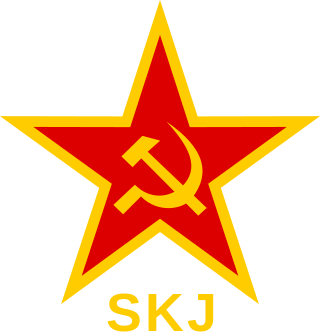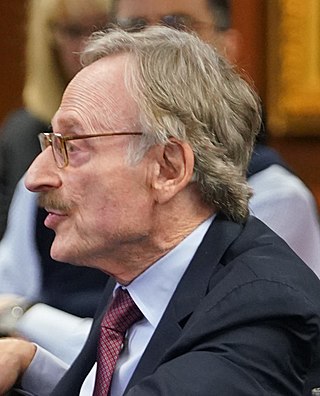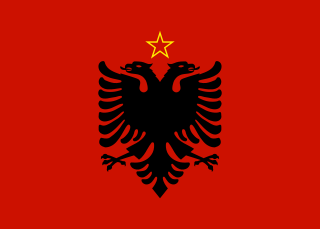
Yugoslavia was a country in Southeast and Central Europe for most of the 20th century. It came into existence in 1918 following World War I, under the name of the Kingdom of Serbs, Croats and Slovenes from the merger of Kingdom of Serbia with the provisional State of Slovenes, Croats and Serbs, and constituted the first union of the South Slavic people as a sovereign state, following centuries in which the region had been part of the Ottoman Empire and Austria-Hungary. Peter I of Serbia was its first sovereign. The kingdom gained international recognition on 13 July 1922 at the Conference of Ambassadors in Paris. The official name of the state was changed to Kingdom of Yugoslavia on 3 October 1929.

Edgar Jean Faure was a French politician, lawyer, essayist, historian and memoirist who served as Prime Minister of France in 1952 and again between 1955 and 1956. Prior to his election to the National Assembly for Jura under the Fourth Republic in 1946, he was a member of the French Committee of National Liberation (CFLN) in Algiers (1943–1944). A Radical, Faure was married to writer Lucie Meyer. In 1978, he was elected to the Académie Française.

Gaston François Marie, Viscount Eyskens was a Christian democratic politician and prime minister of Belgium. He was also an economist and member of the Belgian Christian Social Party (CVP-PSC).

The Croatian Spring, or Maspok, was a political conflict that took place from 1967 to 1971 in the Socialist Republic of Croatia, at the time part of the Socialist Federal Republic of Yugoslavia. As one of six republics comprising Yugoslavia at the time, Croatia was ruled by the League of Communists of Croatia (SKH), nominally independent from the League of Communists of Yugoslavia (SKJ), led by President Josip Broz Tito. The 1960s in Yugoslavia were marked by a series of reforms aimed at improving the economic situation in the country and increasingly politicised efforts by the leadership of the republics to protect the economic interests of their respective republics. As part of this, political conflict occurred in Croatia when reformers within the SKH, generally aligned with the Croatian cultural society Matica hrvatska, came into conflict with conservatives.

The Socialist Federal Republic of Yugoslavia (SFRY), commonly referred to as SFR Yugoslavia or simply as Yugoslavia, was a country in Central and Southeast Europe. It emerged in 1945, following World War II, and lasted until 1992, with the breakup of Yugoslavia occurring as a consequence of the Yugoslav Wars. Spanning an area of 255,804 square kilometres (98,766 sq mi) in the Balkans, Yugoslavia was bordered by the Adriatic Sea and Italy to the west, by Austria and Hungary to the north, by Bulgaria and Romania to the east, and by Albania and Greece to the south. It was a one-party socialist state and federation governed by the League of Communists of Yugoslavia, and had six constituent republics: Bosnia and Herzegovina, Croatia, Macedonia, Montenegro, Serbia, and Slovenia. Within Serbia was the Yugoslav capital city of Belgrade as well as two autonomous Yugoslav provinces: Kosovo and Vojvodina.

Sir James Alexander Mirrlees was a British economist and winner of the 1996 Nobel Memorial Prize in Economic Sciences. He was knighted in the 1997 Birthday Honours.

The League of Communists of Yugoslavia, known until 1952 as the Communist Party of Yugoslavia, was the founding and ruling party of SFR Yugoslavia. It was formed in 1919 as the main communist opposition party in the Kingdom of Serbs, Croats and Slovenes and after its initial successes in the elections, it was proscribed by the royal government and was at times harshly and violently suppressed. It remained an illegal underground group until World War II when, after the invasion of Yugoslavia in 1941, the military arm of the party, the Yugoslav Partisans, became embroiled in a bloody civil war and defeated the Axis powers and their local auxiliaries. After the liberation from foreign occupation in 1945, the party consolidated its power and established a one-party state, which existed until 1990, two years prior to the breakup of Yugoslavia.
Ota Šik was a Czech economist and politician. He was the man behind the New Economic Model and he was also one of the key figures in the Prague Spring.
The Chichele Professorships are statutory professorships at the University of Oxford named in honour of Henry Chichele, an Archbishop of Canterbury and founder of All Souls College, Oxford. Fellowship of that college has accompanied the award of a Chichele chair since 1870.

Jenő Fock was a Hungarian Communist politician who served as Chairman of the Council of Ministers of the People's Republic of Hungary from 1967 to 1975.

Sir Vernon Bernard Bogdanor is a British political scientist, historian, and research professor at the Institute for Contemporary British History at King's College London. He is also emeritus professor of politics and government at the University of Oxford and an emeritus fellow of Brasenose College, Oxford.

Michael Jay Boskin is the T. M. Friedman Professor of Economics and senior Fellow at Stanford University's Hoover Institution. He also is chief executive officer and president of Boskin & Co., an economic consulting company.

Tibor de Scitovsky, also known as Tibor Scitovsky, was a Hungarian born, American economist who was best known for his writing on the nature of people's happiness in relation to consumption. He was associate professor and professor of economics at Stanford University from 1946 through 1958 and Eberle Professor of Economics from 1970 until his retirement in 1976, when he became Professor Emeritus. In honor of his deep contributions to economic analysis, he was elected Distinguished Fellow of the American Economic Association, Fellow of the Royal Economic Society, member of the American Academy of Arts and Sciences, and Corresponding Fellow of the British Academy.

The Hungarian People's Republic was a one-party socialist state from 20 August 1949 to 23 October 1989. It was governed by the Hungarian Socialist Workers' Party, which was under the influence of the Soviet Union. Pursuant to the 1944 Moscow Conference, Winston Churchill and Joseph Stalin had agreed that after the war Hungary was to be included in the Soviet sphere of influence. The HPR remained in existence until 1989, when opposition forces brought the end of communism in Hungary.

The People's Socialist Republic of Albania, officially People's Republic of Albania from 1946 until 1976, was the one-party communist state in Albania from 1946 to 1991. It succeeded the Democratic Government of Albania (1944–1946).
Geoffrey Edwards is a British political scientist specialising in the foreign and security policies of the European Union. A fellow and a Graduate Tutor of Pembroke College, Cambridge, Geoffrey Edwards is also Reader in European Studies at the Department of Politics and International Studies, University of Cambridge and holds a Jean Monnet chair as Director of European Studies at the Jean Monnet European Centre of Excellence at the same university.
Paul Einzig was an economic and political writer and journalist. He wrote 57 books, alongside many articles for newspapers and journals, and regular columns for the newspapers Financial News and Commercial and Financial Chronicle.

The Socialist Autonomous Province of Vojvodina was one of two autonomous provinces within the Socialist Republic of Serbia, in the former Socialist Federal Republic of Yugoslavia. The province is the direct predecessor to the modern-day Serbian Autonomous Province of Vojvodina.
Francis Michel Bator was a Hungarian-American economist and educator. He was a professor emeritus at Harvard Kennedy School of political economy. He was born in Budapest, Hungary. Bator attended the Massachusetts Institute of Technology and earned a Ph.D. in 1956. He was Deputy National Security Advisor of the United States from 1965 to 1967. He was also a Special Assistant to President Lyndon B. Johnson.
Stanko Radmilović was a Serbian and Yugoslav politician and university professor.













